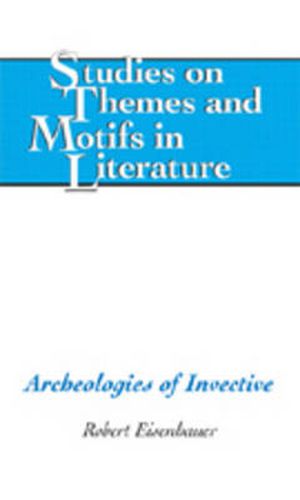Readings Newsletter
Become a Readings Member to make your shopping experience even easier.
Sign in or sign up for free!
You’re not far away from qualifying for FREE standard shipping within Australia
You’ve qualified for FREE standard shipping within Australia
The cart is loading…






This title is printed to order. This book may have been self-published. If so, we cannot guarantee the quality of the content. In the main most books will have gone through the editing process however some may not. We therefore suggest that you be aware of this before ordering this book. If in doubt check either the author or publisher’s details as we are unable to accept any returns unless they are faulty. Please contact us if you have any questions.
Focusing on specimens of discourse where criticism assumes a flagrantly bucolic persona, Archeologies of Invective investigates hitherto little acknowledged contexts of irony, aggressivity, and vilification. After considering briefly Lucilius and Horace, the author evaluates such diverse figures as Poggio Bracciolini, Quevedo, Dunbar, Poe, and Mencken before proceeding to sustained discussion of Goethe’s Italian Journey, Werther, and the Invektiven. In terms of prime-time satiric virtuosity, Byron’s Don Juan recycles pastoral animus, acting as a rogue-like mirror-text of the Schiller/Goethe Xenien of the late 1790s. Sidney’s double sestina and Villon’s Ballad of the Women of Paris are seen inaugurating the modern age, while, at the dawn of the avant-garde, Verlaine’s Invectives sample Goethean and Villonesque attitude at a new level of recherche vulgarity. Low- and Highbrow, outlaw and Philistine resurface in Wyndham Lewis’s Arcadian perspective on the artist-intellectual. Poets Robert Frost and Theodore Enslin are seen reinvigoratoring the edgily agrest scene of invective in America. Archeologies of Invective situates itself also with respect to a psychohistorical terrain - altered states of consciousness reflecting Faustian transition: the dislocation of the peasant class, the empowerment of women as a heterological state within a state, the advent of modern weaponry, and the rise of alcohol - whose genealogy becomes nothing short of a gin-eology. Stable notions of character give way to impersonal, pantomimic terms of art, such as caliber; the hero is displaced by the wanderer, thief, madman, and clown. Not limiting itself to the literary canon, Archeologies includes analyses of gangster films and sports legends in the context of Arcadian motivation. Finally, Eisenhauer places Philip Roth’s American Pastoral within the arc of 19th-century pastoral fiction, locating a prosaic Nowadays in which criticism is still inscribed, as evidenced by Fish’s explication of pastoral in the context of professional correctness.
$9.00 standard shipping within Australia
FREE standard shipping within Australia for orders over $100.00
Express & International shipping calculated at checkout
This title is printed to order. This book may have been self-published. If so, we cannot guarantee the quality of the content. In the main most books will have gone through the editing process however some may not. We therefore suggest that you be aware of this before ordering this book. If in doubt check either the author or publisher’s details as we are unable to accept any returns unless they are faulty. Please contact us if you have any questions.
Focusing on specimens of discourse where criticism assumes a flagrantly bucolic persona, Archeologies of Invective investigates hitherto little acknowledged contexts of irony, aggressivity, and vilification. After considering briefly Lucilius and Horace, the author evaluates such diverse figures as Poggio Bracciolini, Quevedo, Dunbar, Poe, and Mencken before proceeding to sustained discussion of Goethe’s Italian Journey, Werther, and the Invektiven. In terms of prime-time satiric virtuosity, Byron’s Don Juan recycles pastoral animus, acting as a rogue-like mirror-text of the Schiller/Goethe Xenien of the late 1790s. Sidney’s double sestina and Villon’s Ballad of the Women of Paris are seen inaugurating the modern age, while, at the dawn of the avant-garde, Verlaine’s Invectives sample Goethean and Villonesque attitude at a new level of recherche vulgarity. Low- and Highbrow, outlaw and Philistine resurface in Wyndham Lewis’s Arcadian perspective on the artist-intellectual. Poets Robert Frost and Theodore Enslin are seen reinvigoratoring the edgily agrest scene of invective in America. Archeologies of Invective situates itself also with respect to a psychohistorical terrain - altered states of consciousness reflecting Faustian transition: the dislocation of the peasant class, the empowerment of women as a heterological state within a state, the advent of modern weaponry, and the rise of alcohol - whose genealogy becomes nothing short of a gin-eology. Stable notions of character give way to impersonal, pantomimic terms of art, such as caliber; the hero is displaced by the wanderer, thief, madman, and clown. Not limiting itself to the literary canon, Archeologies includes analyses of gangster films and sports legends in the context of Arcadian motivation. Finally, Eisenhauer places Philip Roth’s American Pastoral within the arc of 19th-century pastoral fiction, locating a prosaic Nowadays in which criticism is still inscribed, as evidenced by Fish’s explication of pastoral in the context of professional correctness.